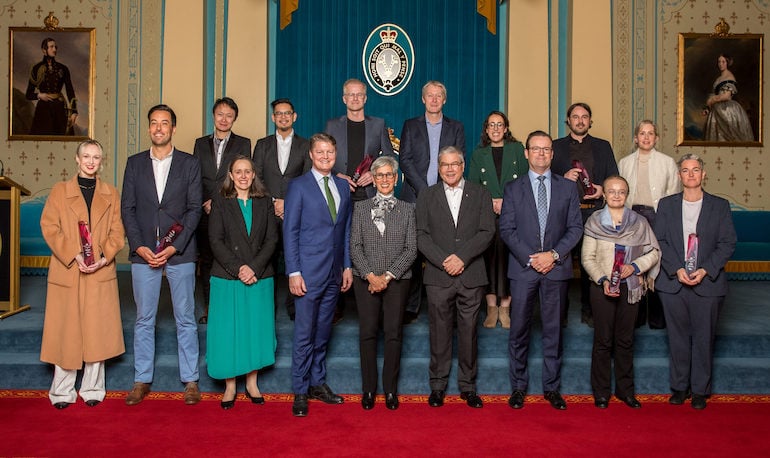How to create inter-generational wealth among people of color and to do so in a way that’s accessible to a critical mass of people? That’s the question four friends who all met through business school connections started discussing in earnest after the 2020 murder of George Floyd and the spotlight on racial inequities it fostered.
Clockwise from right: Havell Rodrigues, Allegra Stennett, Daryl Lindie, Kris Schumacher
Their answer: boost business ownership by people of color, but with a twist. Instead of helping founders start something from scratch, they decided they’d focus on entrepreneurship through acquisition (ETA)—that is, buying an existing business. “It’s a much lower-risk path to entrepreneurship,” says Havell Rodrigues, cofounder and CEO of New Majority Capital, the Providence, RI, company they formed to boost ETA. “You have cash flow from day one.”
That plan rests, in part, on the predicted silver tsunami of businesses coming on the market. That’s because millions of firms owned by baby boomers will be for sale or bequeathed over the next two decades. “This is a unique opportunity for under-represented entrepreneurs to acquire businesses and start on a path of building generational wealth,” says Allegra Stennett, cofounder. In Rhode Island alone, according to cofounder Darryl Lindie, there are about 20,000 small businesses with employees and 80% lack a succession plan.
Foundation
New Majority has two parts. First there’s New Majority Capital Foundation, which runs two programs. One, called Succession Ready, helps existing business owners thinking of retiring, over a period of five weeks, to get their companies ready for succession. Launched last fall in Providence, it covers everything from alternatives to selling to how to increase a firm’s valuation.
The other, which will launch next week, is bETA, an eight-week accelerator aimed at teaching entrepreneurs of color what they need to know to buy and expand an existing business. (It’s in -person for the first and last few days and virtual the rest of the time, a particularly important consideration for participants who hold a full-time job). That includes doing due diligence, hiring and operations, among other topics. It also covers looking for business brokers. At the end, they get a certification from Babson College, which is delivering the curriculum. It’s launching in Rhode Island, but the team plans to expand nationally this year.
New Majority held an introductory workshop in January for about 100 BIPOC individuals, to provide a glimpse of what ETA involves. About 35 or so of those people will comprise the first cohort.
The Fund
Graduates will form a pipeline for New Majority’s $50 million fund. It will provide up to 100% of financing for making an acquisition, with the ability to help finance around 50 acquisitions alongside banks and other investors. There are three structures: One is for people able to make a down payment, the other two are for those who can’t do that. (All include 10% seller financing). Those who have the resources for a 2.5% down payment can access a SBA 7(a)loan, plus a 7.5% equity stake from New Majority and seller financing. Otherwise, they can split debt and equity, plus seller financing. Or New Majority provides 90% of the financing, while placing the entrepreneur on a vesting schedule for 100% equity.
The equity, says Kris Schumacher, cofounder, “is designed to be as non-extractive as possible.”
There’s also a crowdfunding campaign allowing non-accredited investors to invest in the company.
First Plans
The partners first considered the idea of creating a venture studio. It would come up with startup ideas and back founders who could get those businesses up and running. But, they realized, that approach had some glaring problems. First, was the high failure rate for new businesses in the U.S. The other was the likelihood that, because only a few of the ideas would probably succeed, they’d end up focusing their efforts on just a few companies, thereby limiting the number of entrepreneurs able to benefit and start generating generational wealth. “Having just a few people succeed is not going to move the needle,” says Stennett.
Better, they decided, was to offer a soup-to-nuts solution. “We needed a model through which all portfolio companies would have equal support so we could all succeed,” says Rodrigues.
Ultimately, it’s a plan that, the cofounders feel, will work for everyone. “Small businesses are a great driver of wealth creation and a great value proposition for all parties involved,” says Lindie.











